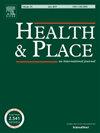Rapid review on healthy ageing interventions that incorporate action on climate change and sustainability in cities and communities
IF 3.8
2区 医学
Q1 PUBLIC, ENVIRONMENTAL & OCCUPATIONAL HEALTH
引用次数: 0
Abstract
Objectives
Intersecting global trends of population ageing and climate change have far-reaching implications for health and sustainability in cities and community contexts. Older adults are highly impacted by climate change, and yet reports of the implementation of the World Health Organizations’ Age-Friendly Cities and Communities (AFCC) approach rarely examine the impacts of climate change on older adults. There is limited research on climate change interventions that target older populations. This rapid scoping review characterizes existing evidence in this area, including climate and health-related interventions involving older populations around the world.
Methods
The PCC framework (Population, Context, Concept) guided the implementation of this rapid scoping review. Peer reviewed articles were sourced from Scopus (Elsevier), Greenfile, Academic Search Complete (EBSCO), Global Health (OVID) and Google Scholar. Grey literature was sourced from Google Scholar, Google and relevant international websites. Inclusion criteria were grey and academic publications in English, after the year 2000 and described an intervention. Screening was undertaken on Covidence software and critically appraised using MMAT and AACODS tools. The AFCC framework was used to guide analysis and interpretation.
Results
Twenty-five articles were included. The review found a paucity of literature describing age-friendly cities and community interventions that considered health-related impacts of climate change on older adults, issues for rural communities and those in developing nations. Climate change was rarely mentioned other than for context in the peer-reviewed literature, and the grey literature was similarly sparse. Peer-reviewed literature was top-down, focusing on disasters and older adults’ vulnerability, whilst the grey literature privileged older adult agency and potential contribution to addressing climate change. Successful interventions were programs that positioned older adults as active, empowered participants.
Conclusions
Climate change justice and resilience should be incorporated explicitly into the AFCC framework. Greater information exchange between Global North and Global South and inclusion of diverse perspectives (i.e., Indigenous knowledge, people with disabilities and/or experiencing homelessness) will enhance policy efforts. Similarly, recognition of the broader impacts of climate change on the fundamental pre-requisites for health across the lifespan such as food, water and energy security are required. Older adults should be seen as a valuable resource integral to the design and implementation of innovative interventions with climate resilience, healthy ageing focus.
目标 全球人口老龄化和气候变化的趋势相互交织,对城市和社区的健康和可持续性产生了深远的影响。老年人受气候变化的影响很大,但有关世界卫生组织老年友好城市和社区(AFCC)方法实施情况的报告却很少研究气候变化对老年人的影响。针对老年人群的气候变化干预措施的研究也很有限。本快速范围界定综述描述了该领域现有证据的特点,包括涉及世界各地老年人口的气候与健康相关干预措施。同行评审文章来自 Scopus (Elsevier)、Greenfile、Academic Search Complete (EBSCO)、Global Health (OVID) 和 Google Scholar。灰色文献来自 Google Scholar、Google 和相关国际网站。纳入标准为 2000 年以后发表的灰色文献和英文学术出版物,并对干预措施进行了描述。使用 Covidence 软件进行筛选,并使用 MMAT 和 AACODS 工具进行严格评估。AFCC 框架用于指导分析和解释。综述发现,描述老年友好型城市和社区干预措施的文献很少,这些文献考虑了气候变化对老年人健康的影响、农村社区和发展中国家社区的问题。在同行评议的文献中,除了上下文之外,很少提及气候变化,灰色文献也同样稀少。同行评议文献是自上而下的,侧重于灾害和老年人的脆弱性,而灰色文献则强调老年人的能动性和对应对气候变化的潜在贡献。成功的干预措施是将老年人定位为积极、有能力的参与者。加强全球北方和全球南方之间的信息交流,并纳入不同的观点(即土著知识、残疾人和/或无家可归者),将促进政策努力。同样,需要认识到气候变化对整个生命周期健康的基本前提(如粮食、水和能源安全)的广泛影响。应将老年人视为设计和实施以气候复原力和健康老龄化为重点的创新干预措施不可或缺的宝贵资源。
本文章由计算机程序翻译,如有差异,请以英文原文为准。
求助全文
约1分钟内获得全文
求助全文
来源期刊

Health & Place
PUBLIC, ENVIRONMENTAL & OCCUPATIONAL HEALTH-
CiteScore
7.70
自引率
6.20%
发文量
176
审稿时长
29 days
期刊介绍:
he journal is an interdisciplinary journal dedicated to the study of all aspects of health and health care in which place or location matters.
 求助内容:
求助内容: 应助结果提醒方式:
应助结果提醒方式:


